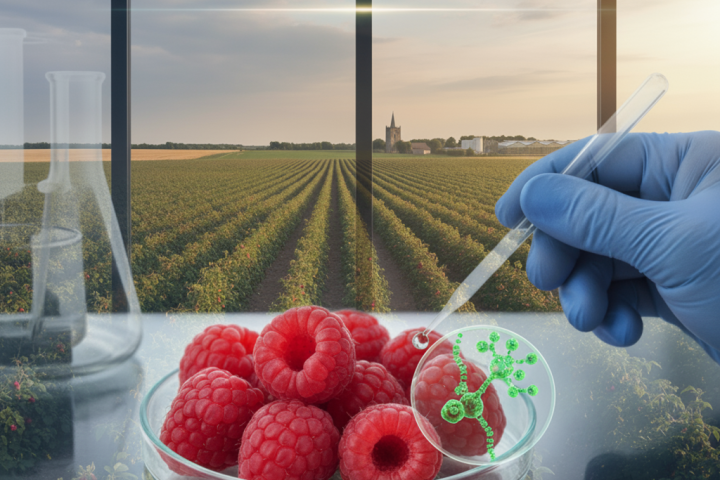Raspberries are a summer favourite in the UK, but they are also notoriously delicate and quick to spoil. Now, scientists at Cranfield University believe they may have found a way to make raspberries last longer, taste better and be grown more sustainably. Their new study is the first to validate the use of CRISPR gene editing in red raspberry (Rubus idaeus), opening the door to major advances in soft fruit production.
The research focuses on a precise new method for editing plant DNA without adding any foreign genetic material. Scientists first isolated individual cells, called protoplasts, from the leaves of raspberry microplants grown under sterile conditions. These cells were then exposed to CRISPR-Cas9, a molecular tool that can be programmed to target exact regions of DNA and introduce changes. Unlike conventional genetic modification, the process does not insert DNA from other organisms. Instead, the edits mirror the kind of mutations that could naturally occur over generations, only accelerated through modern science.
This breakthrough matters because raspberry breeding has traditionally been slow and uncertain. Conventional methods depend on cross-pollination, followed by years or even decades of selective breeding and trialling to identify varieties with improved qualities. By contrast, DNA-free gene editing could allow researchers to design and grow new raspberry varieties in around 12 months. Such speed would make it possible to respond rapidly to farming challenges, consumer demand and climate pressures.
The potential benefits are wide-ranging. Edited raspberries could be made to resist mould, which is one of the main causes of food waste in soft fruits. They could also be bred to withstand heatwaves and drought, which are becoming more frequent with climate change. Other traits might include sweeter taste, larger fruit size, seedless varieties, and higher overall yields. Each of these would contribute not only to a better eating experience but also to greater efficiency for farmers and reduced waste in the supply chain.
The team, led by PhD researcher Ryan Creeth alongside Professor Andrew Thompson and Dr Zoltan Kevei, emphasise that the technology should not be confused with traditional genetic modification. “Precision breeding techniques are essential for tackling food waste, improving food sustainability and nutrition, and lowering the cost of food,” said Creeth. He added that while further work is needed, especially to regenerate full plants from the edited cells, the study represents “a promising start for one of the nation’s favourite soft fruits.”
One gene tested in the study was NPR1, which in tomatoes has been shown to increase resistance to grey mould when edited. If a similar outcome is achieved in raspberries, it could mean fruit with a significantly longer shelf life, cutting waste at every stage from farm to supermarket to consumer fridge. For shoppers, this could translate into raspberries that stay fresh for days longer than current varieties.
Another crucial factor is regulation. The UK’s Genetic Technology (Precision Breeding) Act, passed in 2023, created a clear legal framework for DNA-free gene editing in crops. Because CRISPR is introduced as a protein and guide RNA rather than integrated into the plant’s genome, the resulting raspberries would not count as genetically modified organisms under the law. This makes the research directly relevant to future commercial cultivation in England, where such crops could soon reach farms and supermarkets.
The study is not only a scientific milestone but also part of a broader trend in agriculture. Gene editing is being tested in a range of crops from wheat to tomatoes, offering the chance to improve nutrition, resilience and sustainability. Applying these methods to raspberries is particularly significant given their popularity and their short shelf life, which makes them one of the fruits most often wasted by consumers.
While challenges remain in regenerating full raspberry plants from the edited protoplasts, Cranfield’s breakthrough shows that the key technical barrier—proving that raspberry DNA can be edited with CRISPR—has been overcome. If the next stages are successful, raspberries may soon join the growing list of crops benefiting from precision breeding.
For consumers, that could mean fruit that is tastier, fresher and more sustainable. For farmers, it could mean crops that are more resilient and easier to grow. And for the planet, it could mean a step towards reducing the food waste and resource use that comes with today’s soft fruit production.
Raspberries may be fragile, but this research suggests their future could be stronger than ever.










